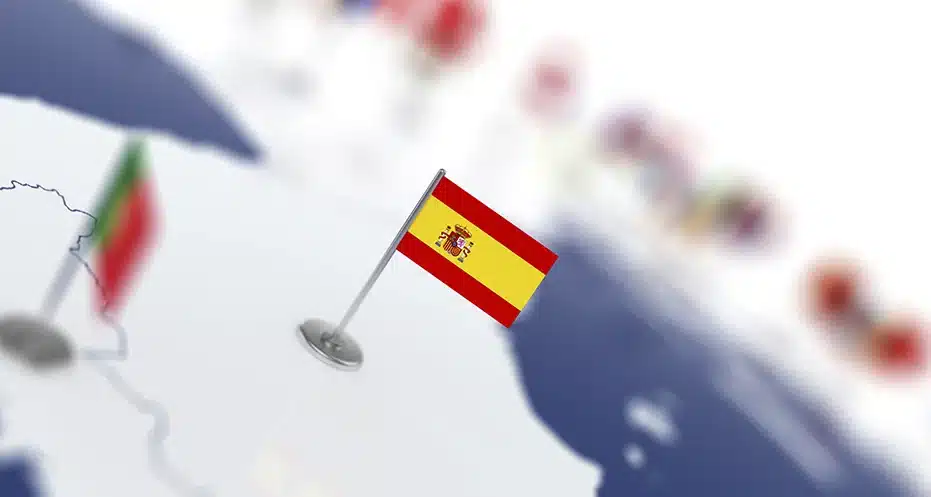DiliTrust as part of its international growth strategy has opened an office in Madrid. Directing the team is Yann Sabot. A graduate of HEC Paris and a holder of a DESS degree in Business Law and Corporate Tax from the University of Paris IX Dauphine, Yann has worked extensively for large corporates and brings a wealth of experience to this role. He has a strong background working on projects that relate to governance including mergers and acquisitions, development projects, the opening of subsidiaries and participation in subsidiary boards of directors.
1. WHY SPAIN?
Since 2014 the Spanish economy has experienced steady growth, with the economy exceeding 3% growth since 2015. Economic forecasts predict that beyond 2018, growth will continue at this rate. In the aftermath of the financial crisis, Spain has undergone huge restructuring and economic modernisation. It has striven to make crucial countrywide changes by deeply restructuring its banking sector along with streamlining and modernising its public administrations. Especially evident today are the sweeping changes in mentalities concerning how companies are directed and administrated.
The financial crisis highlighted several weaknesses and failures in the Spanish economy and these included governance issues. Between 2008 and 2016, more than 45,000 Spanish companies went bankrupt. Prominent examples included regional banks, Bankia and Banco Popular. Also notable were the bankruptcies of Martinsa Fadesa, Isolux, Royal Urbis, within the construction and real estate industries. But no industry was left unscathed. Rumasa (Food), Pescanova (Fishing), Fagor (Manufacturing), and Adveo (Office Materials) were also huge casualties of the crisis. Some of these companies were able to rebuild in the aftermath of their collapse, while others could not. In the majority of these cases, the instance of poor governance and lack of control contributed massively to bankruptcy.
As the Spanish economy returns to growth and attracts more and more foreign capital, the current context is ideal for proposing solutions to facilitate and accelerate this economic transformation. It is also a key moment to reinforce the importance of governance in Spain as companies look to the future. As a border country, Spain is culturally close to France. Along with Italy and Portugal, Spain is a natural choice for market expansion. Cultural proximity is also present in terms of the legal framework of companies and in how companies are run. The “Latin” countries are somewhat behind in adopting governance practices that are strongly established in Anglo-Saxon and northern European countries. This presents itself as a viable opportunity for DiliTrust because the market is not yet fully developed. DiliTrust, as a French owned company, intrinsically understands “Latin” culture compared to other European competitors, for example, those who hail from Anglo-Saxon countries. DiliTrust offers its clients a very European centric approach to business. It prioritises security and the autonomy of its customers, in line with GDPR legislation. DiliTrust servers are located in Europe and therefore client data is not subject to U.S. data legislation, for example, the Freedom Act and the Cloud Act.
2. WHAT DO DILITRUST Want TO ACHIEVE IN SPAIN?
It is simple: DiliTrust wants to quickly become one of the top specialist publishers in corporate governance solutions in Spain. This is part of the groups international development strategy announced at the end of 2017.
3. WHAT ARE THE CURRENT GOVERNANCE PRACTICES IN SPANISH COMPANIES?
Large Spanish companies often have many legal entities and governance bodies, and frequently, these roles are often held by directors who sit on several boards at the same time. Software solutions like DiliTrust Exec and DiliTrust Governance facilitate seamlessly the work of board members and management, to overview and organise the various tasks and obligations of their organisations.
In recent years, governance practices have changed, particularly in large international groups. The proportion of independent directors remains low but is increasing. Administrator positions also tend to be more dispersed within these companies. In contrast, in unlisted, family or medium-sized companies, these practises are less developed. DiliTrust facilitates through its software, enhanced and efficient interaction with outside administrators.
Within very large international groups in Spain, governance bodies and Legal Departments do not utilise technology enough to drive productivity, for example constant emailing and paper printing, are just some instances of this behaviour. Digitalisation is at the heart of strategy for many large Spanish groups that are now entering their stride post-recession. This concerns all sectors of activity. Adopting a platform like DiliTrust Exec or DiliTrust Governance would securely streamline and organise efficiently the daily running of these organisations, allowing users more time to focus on key business issues.
4. WHAT ARE THE CHALLENGES WHICH ENTERPRISES MUST FACE NOW AND IN THE FUTURE?
In terms of corporate governance, organisations face major challenges. These include:
- The sheer volume of documentation and information that administrators must review before and during meetings, while still following, processing and collaborating with other colleagues.
- The internationalisation of boards of directors: board members who are abroad and travelling continuously need to be kept informed regardless of their location. Legal teams in Legal Departments also face the same issue when operating worldwide as they need to collaborate easily and productively, together.
- The need to secure sensitive data: companies are facing huge risks of cyber-attacks if their data is not secured.
- The need for companies to remain compliant and transparent while also maintaining their confidentiality. Regulations are constantly changing and so companies must evolve and adapt their needs constantly.
5. WHAT ADVICE WOULD YOU GIVE ORGANISATIONS TO ADDRESS THESE CHALLENGES ?
Businesses need to realise the tremendous opportunities that digitalisation affords. To do so, they must equip themselves with tools that allow them to chart their decisions, become more efficient as business becomes more complex while all the while protecting their data. For Spanish companies, this means amending their governance practises to meet global standards.
The solutions offered by DiliTrust are digital solutions that have been proven to meet the modern challenges of governance. They have been designed for directors, corporate legal secretaries and the Legal Departments of large and medium sized companies. We look forward to working closely with Spanish enterprises to help them achieve better corporate governance and securely share their data.



